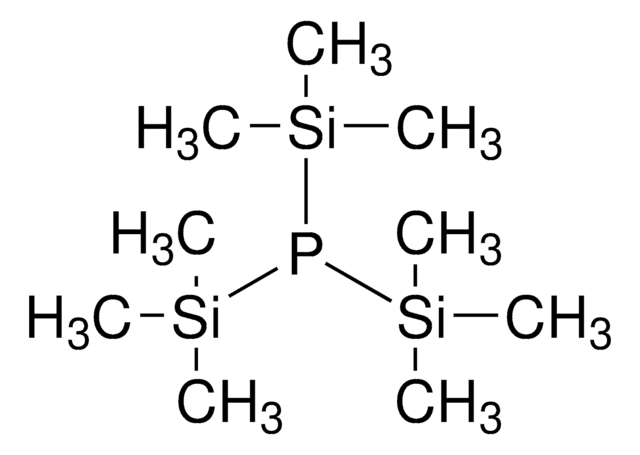366870
Indium(III) phosphide
pieces, 3-20 mesh, 99.998% trace metals basis
Synonyme(s) :
Indium monophosphide, Indium phosphide
Se connecterpour consulter vos tarifs contractuels et ceux de votre entreprise/organisme
About This Item
Formule linéaire :
InP
Numéro CAS:
Poids moléculaire :
145.79
Numéro CE :
Numéro MDL:
Code UNSPSC :
12352300
ID de substance PubChem :
Nomenclature NACRES :
NA.23
Produits recommandés
Niveau de qualité
Pureté
99.998% trace metals basis
Forme
pieces
Pertinence de la réaction
reagent type: catalyst
core: indium
Taille des particules
3-20 mesh
Chaîne SMILES
P#[In]
InChI
1S/In.P
Clé InChI
GPXJNWSHGFTCBW-UHFFFAOYSA-N
Mention d'avertissement
Danger
Mentions de danger
Conseils de prudence
Classification des risques
Carc. 1B - Repr. 2 - STOT RE 1
Code de la classe de stockage
6.1C - Combustible acute toxic Cat.3 / toxic compounds or compounds which causing chronic effects
Classe de danger pour l'eau (WGK)
WGK 3
Point d'éclair (°F)
Not applicable
Point d'éclair (°C)
Not applicable
Faites votre choix parmi les versions les plus récentes :
Déjà en possession de ce produit ?
Retrouvez la documentation relative aux produits que vous avez récemment achetés dans la Bibliothèque de documents.
Alberto L D Moreau et al.
Biosensors & bioelectronics, 36(1), 62-68 (2012-04-28)
The development of highly-sensitive and label-free operating semiconductor-based, biomaterial detecting sensors has important applications in areas such as environmental science, biomedical research and medical diagnostics. In the present study, we developed an Indium Phosphide (InP) semiconductor-based resistive biosensor using the
Ilaria Bargigia et al.
Applied spectroscopy, 66(8), 944-950 (2012-07-18)
We present a new compact system for time-domain diffuse optical spectroscopy of highly scattering media operating in the wavelength range from 1100 nm to 1700 nm. So far, this technique has been exploited mostly up to 1100 nm: we extended
Xuan Zhang et al.
Nanotechnology, 23(27), 275103-275103 (2012-06-20)
Direct comparisons of different types of nanoparticles for drug delivery have seldom been performed. In this study we compare the physical properties and cellular activity of doxorubicin (Dox) conjugates to gold nanoparticles (Au) and InP quantum dots of comparable diameter.
Kouta Tateno et al.
Nano letters, 12(6), 2888-2893 (2012-05-19)
We investigated the Au-assisted growth of alternating InAsP/InP heterostructures in wurtzite InP nanowires on InP(111)B substrates for constructing multiple-quantum-dot structures. Vertical InP nanowires without stacking faults were obtained at a high PH(3)/TMIn mole flow ratio of 300-1000. We found that
Myung-Joon Kwack et al.
Optics express, 20(27), 28734-28741 (2012-12-25)
A strictly non-blocking 8 × 8 switch for high-speed WDM optical interconnection is realized on InP by using the phased-array scheme for the first time. The matrix switch architecture consists of over 200 functional devices such as star couplers, phase-shifters
Notre équipe de scientifiques dispose d'une expérience dans tous les secteurs de la recherche, notamment en sciences de la vie, science des matériaux, synthèse chimique, chromatographie, analyse et dans de nombreux autres domaines..
Contacter notre Service technique








